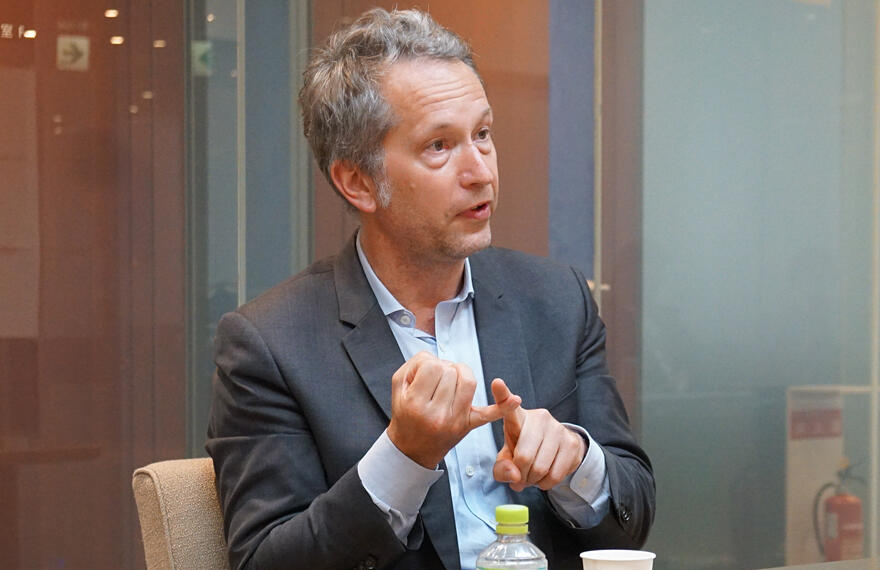Promoting international research mobility and creating international talent circulation is an essential condition for robust research and development. To this end, it is important to internationalize the research ecosystem, promote international human resource exchange, and ensure that Japan is firmly integrated into the international brain circulation network. Under this special topic, we will introduce the current status and challenges of Japan's research efforts to promote international brain circulation to produce outstanding research results as well as the attractiveness of Japan's research environment, which is the key to attracting foreign researchers, through a series of interviews with relevant people in the field. In this interview we spoke to Dr. Sébastien Lechevalier, President of the Fondation France‐Japon de l'EHESS.
One of the most important aspects of science, technology and innovation is how it can be applied to society. Japan is keenly aware of this as it attempts to lead the way towards the realization of Society 5.0, and international brain circulation is a key factor in driving the convergence of knowledge needed to make this into reality. Social scientists play a key role in linking new technologies to society in a way that provides wellbeing to all people.
As part of our series of interviews into this topic, we spoke with Dr. Sébastien Lechevalier, a French economist who works as a Professor at the School of Advanced Studies in Social Sciences (EHESS), Paris and serves as President of the Fondation France‐Japon (FFJ) de l'EHESS. He has been closely involved with Japan since his days as a post‐graduate researcher who is working hard in driving the integration of social science with technology and engineering. In the interview, he shared the spark that led to his love for Japan and interest in Asian capitalism, what he sees as the key drivers of international brain circulation, his views on integrating the social and physical sciences, and some information about his ongoing research projects.

An unlikely spark leads to research into Japan
Could you briefly talk about your research, areas of interest, and how you became interested in Japan?
I am an economist. I started out as a labor economist, and then expanded to other topics such as productivity, innovation and technologies. Many of my French colleagues gained an interest in Japan through culture like films and literature or manga and animation, but in my case, the spark was a little bit more serious: unemployment.
When I was young, a key dimension of the French economy and society was its high unemployment. I immediately became interested in how I could help my country reduce this issue. When I started my PhD, it was very common to compare the European and US labor markets, and the conclusion was very simple ‐ the US market is very flexible and efficient while it is more rigid in Europe, with too many regulations and other issues. I was about to start a comparison between the US and France, but in a stroke of luck, I met my supervisor, Dr. Robert Boyer, who discovered Japan in the late 80s or early 90s and liked the country very much. He said to me, "Look, we have a country which could be a great case study."
This was during the Obuchi Administration. Japan was facing a terrible financial crisis and the growth rate was comparatively low to what it had been. Even so, the unemployment rate was only about 4%, and the Japanese people were unhappy. We saw PM Obuchi apologizing on TV because it became so high while at the same time, our French PM Lionel Jospin was appearing on TV, saying, "Look, now it's 9%. This is a great success!"
This was my introduction to Japan, and for the last 25 years, I have been studying the Japanese economy and its society. I found the Japanese attitude towards the economy and to keeping a certain level of equality among people very interesting. This persists through the idea of 'new capitalism,' put forward by the Kishida Administration, and sustainable capitalism developed by the Keidanren. In Japan, companies need to make profits and be innovative, but at the same time, they have a responsibility towards their employees.
I am actually more interested in technologies and innovation such as the idea of "Society 5.0". This is quite a unique vision, where innovation is dedicated to social wellbeing, caring for the elderly or solving societal problems. This could not be elaborated in the US or in many European countries. I am conducting research on the conditions required for the emergence of Society 5.0. It's not easy to integrate different types of knowledge but it's worth trying.
You are co‐founder of the FFJ (Fondation France‐Japon) which accommodates many young Japanese researchers in France. How did you come to the creation of the FFJ?
I have visited Japan many times during the course of my research, but I had a total sense of "lost in translation" the first time because everything was written in Japanese. Despite this, I was very warmly welcomed by Japanese people and institutions, such as the Ministry of Health, Labour and Welfare and the University of Tokyo. They were very patient, and gave me a lot of assistance in accessing data, books or information. The way I was welcomed as a young academic touched me deeply.
The Creation of the FFJ is a token of my appreciation towards Japan as I wanted to give back in return for the generosity that I received. I have only managed gave back about 10%, so I still have a lot to do! We offer modest facilities that can accommodate Japanese scholars visiting France. We began by inviting economists, but the scope of researchers has since expanded to include other areas such as technology, innovation, urbanism, among other fields, to integrate a range of social sciences. As a result of our collective work with French and Japanese researchers at FFJ, we brought out a publication in 2019 on the theme of innovation which goes beyond technology.

(Provided by FFJ)
The importance of International Brain Circulation
In terms of attracting more young foreign talent to Japan. How do you see the current situation as a researcher specialized in the country?
Before talking about inward mobility, let me say a few words on outward mobility as they are inter‐connected. The more excellent Japanese researchers you have experience research abroad, the more they will actively engage in collaboration with foreign researchers visiting Japan. I am concerned to hear that there are fewer young Japanese researchers going to top foreign universities such as Harvard, and I often hear government officials complaining about the lack of willingness in the younger generation to go abroad. Maybe there is less outward mobility, but do not underestimate the young Japanese researchers who nonetheless went overseas. We received some of them in Paris at my institution and they were excellent. Even if numbers have fallen slightly, the level and quality of their work remains excellent. These people may go back to Japan to share their knowledge and experience, thus creating the conditions for stimulating exchange with foreign researchers.
In terms of inward mobility over the last two decades, until the COVID‐19 situation, Japan took steps to open up and internationalize its academia and higher education. Things were moving in a good direction. This was visible in terms of the number of agreements with foreign institutions, research mobility or hiring foreign professors. I was quite optimistic about these significant developments.
Then the pandemic happened and suddenly everything came to a halt. The country was completely closed. This also happened in other Asian countries, and was in sharp contrast with what was done in Europe. We kept the door open, especially in academia, while making efforts to protect the population. It was only a short period but has had a negative effect on the process of internationalization in Japan. We should draw some lessons from that.
Now Japan is reopening and my advice would be to send a strong signal that the COVID‐19 period is over and Japan wants to continue the process of internationalization and invite foreign collaborators. I am now cautiously optimistic.
What do you think are Japan's strong points in attracting foreign students and researchers and what are some shortcomings to overcome?
From my perspective, Japan's research infrastructure, such as libraries and data, is excellent. In France, a brand‐new campus called 'Campus Condorcet' dedicated to the social sciences was created in the north of Paris, but it has been unable to reach the level of US or Japan so far in terms of quality of libraries and many facilities are still missing.
From my own experiences I would say that Japanese researchers are quite open and willing to discuss and share their research outputs and are curious about each other's research. I think a positive point for foreign researchers is that there is a good balance between opportunities to focus on your own work and to engage in discussion with others. I think the best research environment is a mix of these two things.
The situation can, of course, always be improved. As an example, better access to non‐Japanese information could be of benefit to foreign researchers. With English being the lingua franca in science, better access to more information in English is important. This could be a point to be improved.
My next point might be a bit of a contradiction, but I think it's important not to lose specificities in research derived from language. Japanese should be kept as a language for study and research. You can translate some concepts from one language to another, but that's not always the case. Although English and other languages should be used more, it's also important to continue research in Japanese and to promote translation of it.
Another point is that there can be issues the use of English in communication, but I see some important progress in the younger generations towards being able to have discussions and share ideas. They are often criticized because of their lack of willingness to go abroad, but when I attend seminars, language isn't a problem. What seems to be more of a general issue in seminars in Japan is that they are less open to discussion and debate.
This is important because it is where inward meets outward mobility. But we can expect that when they have more international experience abroad, they will be more willing to engage in different communication in their academic life after their return home. This will hopefully lead to respectful dialogue, debates, and a stronger ability to discuss differing viewpoints. There is still room for improvement in Japan and I think academic and scientific life can be even more lively by promoting this kind of culture.

The social sciences as a co‐driver of innovation
How do the social sciences contribute to innovation?
That is a very important question and the core of my current research. When we talk about innovation, we tend to think of engineers or technology providers. For too long however, we have exclusively focused on technologies, and we have overlooked the ethical considerations beyond their practical, social and economic implications. In my opinion, the contribution of social sciences to innovation should go beyond simply connecting technology to the market. One of the major criteria for receiving funding from the EU is the position of social sciences. It's very important to improve the integration of social sciences and technology.
I am glad to see these changes, but there are still issues. Social scientists used to hold the opinion that 'technology is not my issue'. Nowadays, there is the idea that innovation or technologies are not only technical ideas but also involve social values. You may have two groups of engineers developing the same technology in different environments, but the outputs will have different characteristics because they incorporate different beliefs, values or priorities.
This is visible in Japan through the evolution of its Science and Technology Basic Plan since the 90's. The importance of society and social sciences has increased over the decades and is now very visible in the vision of Society 5.0. So clearly, social scientists can contribute. But in what fashion? It is important to make progress, but how can we integrate social sciences with engineering? One thing to avoid is only introducing social scientists at the end of the process. Engineers developing the technology often come to us at the end of the process saying, 'How can we make this acceptable to society?'
I am currently studying robotics and its application to healthcare, with aged‐care as a typical example. The potential viewpoint of an engineer is, "I produced this technology and it was used in this industry, we just need to modify it and apply it to this new field." I don't think this is the best way to proceed. Collaboration between social scientists and engineers should start from the very beginning, we have the same goals but also difficulties in communication which is the challenge of multidisciplinary research. When you move towards a radical goal like Society 5.0, you really need to put social sciences at the beginning of the process, not at the end.
I am part of a large consortium of French and Japanese researchers in a project called 'Care‐led innovation.' It's the continuity of innovation beyond technology. The key question is how we can combine technological innovation and issues related to care, and the relationship between people. How do we take care of elderly people and also identify the diverse sources of human wellbeing? The idea is to evaluate the use of new technologies in terms of aged‐care and to try to measure wellbeing which is fundamentally subjective and heterogeneous.
At present, we are engaged in dialogue with medical doctors, political scientists, sociologists, economists and other professionals, and spent the first year just trying to agree on the criteria for wellbeing and the research agenda. I think it's a good example of the way social sciences and engineering should interact in a constructive way.
This project involves several Japanese universities and French institutions in Paris, Toulouse, Marseille and other places. Let's see how it evolves in the years to come. Our ambitions are very high, and I cannot tell you what the end result will be, but we will try our best. At this stage, we see how difficult the road will be as we are not speaking the same language. It's not only a linguistic problem but rather a conceptual, cross‐disciplinary language problem. It's even more difficult to engage yourself in such multidisciplinary international research as this.

Japan's position in the Asia and Pacific regions
The APRC was created in recognition of the Asia‐Pacific region's rapid economic growth and impact on technology and innovation. How do you see this region from the point of view of science research?
In Europe, and possibly also North America, everybody thinks they know Asia, but there is a tendency to oversimplify its diversity. My role in the context of France and Europe is to promote greater exposure of Asia to aid in the correct understanding of Asian diversity.
When it comes to Asia, 30 or 40 years ago, everything was about Japan. The overwhelming train of thought was that Japan was completely dominating Asia, which was partly true, and everybody would follow the Japanese way. But over the last few years, China has usurped that position. Many people equate Asia with China, forgetting about other countries like Vietnam. I want to invite Europeans to see Asia in all of its diversity. Things are progressing very quickly in Asia and it's worth looking at and trying to understand without stereotypes. I have some students from Indonesia, Malaysia and other countries in Southeast Asia and I learn a lot from them. Vietnam is growing very quickly, Korea is very dynamic and my dear Japan is facing some difficulties, such as its super‐aged society. I don't like to talk about the 'decay' of Japan, as if this is the case, we have to say that Europe is also decaying. I think it is just a reflection of the fact that the rest of the world is growing.
That's why, from a European perspective, we need to have a dialogue with all Asian countries, but especially with focus on the democracies. My advice when I talk with people in France or Europe is to value the scientific dialogue with our colleagues coming from these countries. We should not forget our Chinese friends, of course. I can't speak for mathematics or theoretical physics, but in terms of the field of social sciences, I see that the conditions in which they are conducting their research have been deteriorating. It's really problematic.
To sum up my opinion, our dialogue with Asia should be with countries where social scientists can do their research in a democratic environment without interference from the government. Academic freedom is a fundamental value, and I think this is what we share with Japan.
So do you suggest that France and Europe should take a more diverse view of Asia, but with appropriate differentiation in approach according to academic conditions?
Exactly. We need to draw all the lessons from this general statement, including for all individual academic research. I am discussing this question with the President of EHESS. I know there are also discussions about this at CNRS, the largest research institution in France. We should continue collaboration with all countries, but there is a fundamental reason to differentiate the way in which we collaborate.
(Interview conducted at JST Tokyo Headquarters on May 19, 2023,
Interviewer: Yoshihiro Higuchi, Director for Global Strategic Issues, JST)
Afterword
Dr. Lechevalier's love for Japan and deep interest in the economic landscape of Asia came across very strongly during our conversation with him. His understanding of undertaking research in a foreign country and the lessons he learned from it have allowed him to also contribute to international research mobility and brain circulation through his work at the FFJ. Looking broadly at Asia, understanding its diversity and taking lessons from the differences that can be seen is an important factor to be considered in attracting talented researchers to Japan. We hope to see more examples of his work towards the integration of social and physical science into the future.

Profile
Sébastien Lechevalier
Economist, Professor at the School of Advanced Studies in Social Sciences (EHESS), Paris and President of the Fondation France‐Japon (FFJ) at EHESS.
With a keen interest Asian capitalism and Japan, he has various research experiences at different Japanese universities. He is also the founder and the President of the FFJ. He recently joined the Canon Institute for Global Studies (CIGS) as an International Senior Fellow.
<About EHESS>
EHESS is a graduate‐only research institution and it hosts scholars from all over the world committed to the study of contemporary societies seen within broad cultural and historical contexts. It trains students up to PhD level in all disciplines of the social and human sciences. With its high percentage of international students and faculty, EHESS has created a unique global academic network. With over 1,000 round‐table seminars a year, in which faculty and guest scholars present and discuss their current research with students, EHESS occupies a central position in French intellectual life.
EHESS homepage: https://www.ehess.fr/en
<About FFJ>
The Fondation France‐Japon (FFJ, France‐Japan Foundation), established in 2009 at the EHESS, aims to promote academic collaboration between Japan and France and to enhance dialogue and exchanges through a network of public and private partners to improve the understandings of Japan. The FFJ encourages an interdisciplinary approach to the humanities and social science. Its main activities include the development of invitation programs in France for Japanese researchers and specialists of Japan.
FFJ homepage: http://ffj.ehess.fr/
Produced by the Science Japan Editorial Team




